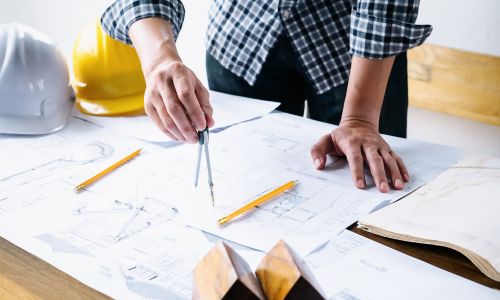If you’re planning to build or renovate a home or commercial property in Australia, you’ve likely come across the terms “building designer” and “architect.” While these professionals often work in similar areas, their qualifications, responsibilities, and legal requirements vary significantly. Understanding the difference between a building designer and an architect can help you choose the right professional for your project.
This guide breaks down the roles, qualifications, and when you might choose one over the other, ensuring your project stays on time, within budget, and aligned with your vision.
What Is a Building Designer?
A building designer is a professional who specialises in the design and documentation of residential, commercial, and industrial buildings. They are often engaged for new builds, renovations, extensions, and even energy-efficient home design.
Unlike architects, building designers typically hold a Diploma or Advanced Diploma in Building Design and are registered under the Building Design Practitioners Regulation in their respective state or territory. In Victoria, for example, a registered building designer must be listed with the Victorian Building Authority (VBA).
Building designers are particularly skilled in:
-
Residential design and drafting
-
Space planning and functionality
-
Energy-efficient design
-
Council approvals and compliance
-
Cost-effective material selection
They are a popular choice for homeowners or small-scale commercial developers who want customised home design solutions without the full scope or cost of architectural services.
What Is an Architect?
An architect is a licensed professional who has completed a university degree (typically five years), followed by a period of practical experience and passing a registration exam through the Architects Registration Board in their state or territory.
Architects bring a high level of design theory, innovation, and large-scale planning expertise. Their training prepares them to handle complex builds, oversee multi-stage developments, and push the boundaries of form and function.
In addition to design, architects are qualified to:
-
Manage entire construction processes
-
Supervise consultants and contractors
-
Perform detailed site analysis
-
Navigate heritage overlays and town planning challenges
-
Provide creative architectural solutions beyond standard compliance
For high-end residential builds or complex commercial projects, an architect may be the preferred option.
Key Differences Between Building Designers and Architects
| Criteria | Building Designer | Architect |
|---|---|---|
| Education | Diploma/Advanced Diploma | 5-year university degree + registration |
| Licensing | Registered (state-dependent) | Licensed with Architects Registration Board |
| Scope of Work | Residential & small commercial | Residential, commercial, institutional |
| Design Focus | Functional, compliant, budget-conscious | Conceptual, innovative, high-spec |
| Project Size | Small to mid-scale | Small to large-scale |
| Cost | Generally more affordable | Typically higher fees |
Both professions can produce high-quality designs but the scale, complexity, and creative ambitions of your project may help determine which professional best suits your needs.
When Should You Hire a Building Designer?
You might consider engaging a building designer if:
-
You’re building a new home or unit development in a suburban area
-
You’re planning an extension or renovation
-
You need help with town planning approvals
-
Your project requires cost-effective design options
-
You value energy-efficient and sustainable solutions
-
You’re seeking personalised service for a residential build
Building designers often work closely with builders, engineers, and local councils to ensure your design is both beautiful and compliant.
When Is an Architect the Better Choice?
An architect may be the better fit if:
-
You’re working on a unique or luxury residential home
-
The site has design challenges (e.g. slope, heritage overlay, limited access)
-
You’re developing multi-storey or commercial buildings
-
You want a bold, statement-making design
-
You require extensive project management from concept to completion
Architects are trained to handle these complexities while delivering creative outcomes that align with your vision and budget.
Building Designer or Architect: Who Should You Choose?
There’s no one-size-fits-all answer. The decision should depend on your project type, budget, timeline, and personal preferences.
If you value functional, cost-effective design for a home renovation or modest development, a building designer may be ideal. For high-end, custom builds that demand bold creativity or involve complicated planning regulations, an architect could be worth the investment.
It’s also important to ensure that whichever professional you hire is registered, insured, and experienced in projects similar to yours.
Final Thoughts
Whether you’re building your forever home or launching a new commercial space, understanding the roles of building designers and architects is crucial to the success of your project. In many cases, both professionals contribute meaningfully to Australia’s built environment, each offering unique advantages depending on your needs.
Always check credentials, view past work, and request a detailed scope of services before making a decision. The right design professional will not only bring your ideas to life but also guide you through the regulatory and construction process with confidence.
FAQs
What qualifications does a building designer have in Australia?
Building designers usually hold a Diploma or Advanced Diploma in Building Design. In Victoria, they must be registered with the Victorian Building Authority.
Can a building designer draw house plans for council approval?
Yes. Registered building designers are qualified to prepare plans and documentation for council approvals, including planning and building permits.
Is it cheaper to hire a building designer or an architect?
Generally, building designers are more affordable. However, costs can vary depending on project scope and location.
Can a building designer manage my construction project?
Some building designers offer project coordination or work with trusted builders, but they don’t usually offer full project management services like architects.


